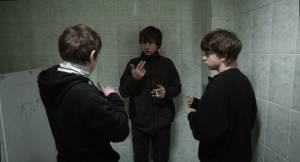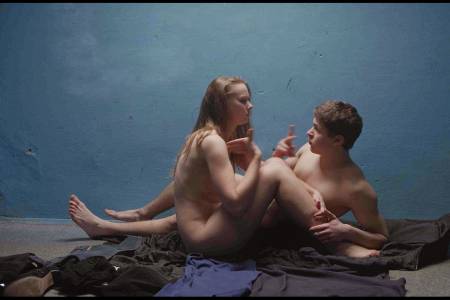This review originally appeared in the New Directors/New Films Festival Coverage thread four months ago.
MYROSLAV SLABOSHPYTSKIY: THE TRIBE (2014)
Yana Novikova and Grigory Fesenko in The Tribe
School of hard knocks for the deaf seen in gestural tableaux
Those looking for movie novelty will certainly find it in Myroslav Slaboshpytskiy's new Ukrainian film The Tribe, a hit at Cannes 2014 and with festival reviewers. The initial gimmick, and it's a strange and original one, is that all communication in the film takes place between predominantly young deaf people presumed to be at a boarding school who speak only in sign language. In Ukrainian. And there are no subtitles provided. I say "presumed," because this is like no boarding school you've ever seen, not even the borstals of Alan Clarke's realistic films. After a new boy Sergey (Grigory Fesenko) arrives following some sort of (silent) graduation ceremony, he's sent to a class where the government's pre-Maidan anti-EU decision seems to come up. After that, Sergey is not seen in a class. He's much too busy being hazed and tested; then being involved in the school's drug and prostitution activities, which seem to involve a wood shop teacher (Alexander Panivan), and two girls, Anya (Yana Novikova) and Svetka (Rosa Babiy), who are taken to work at a truck stop. Sergey pays for a session with Anya, and then they become lovers. The girls seek visas to Italy, which becomes complicated. The plot gets quite complicated after that, in a series of events leading up to a violent finale.
Writers about this film have called its events "shocking" and "vivid," and perhaps they are if taken literally, notably a series of brutal murders and, before that, a crude anesthetic-free abortion suffered by Anya, during which she cries out long and pitifully in pain -- an ugly moment all the more striking because the actors rarely make sounds in this film. The trouble is that the young deaf non-actors enlisted by Slaboshpytskiy for the film's scenes, who are enthusiastic, to say the least, seem to be miming rather than literally enacting events. The sex scenes are obviously faked. The other scenes are much the same, except that the boys do hit each other pretty hard at times when acting out fights or physical abuse. But they seem to be exaggerating everything, and sign language seems itself to involve much over-emphatic gesturing.
It is not that such activities as these couldn't take place in a school; only the film fails to establish and maintain the atmosphere of a functioning school, focusing on the sex and moving of drugs (a lot of plastic bags stuffed with littler bags), the mugging of locals for money and booze, the beating up of one or two boys, and Sergey's quick ascent from newbie nobody to functioning unit in the "school's" bad behavior. These events often happen at night. But when does the school happen?
It therefore ultimately seems a stretch to call this a school, because it is only partially established as one. But it likewise seems a bit over-imaginative to refer to what goes on here, as Justin Chang, writing from Cannes for Variety, does, as "a violent cesspool of organized crime." It's just not realistically enough staged to seem that. One of the key elements, and a serious limitation, is that Slaboshpytskiy stages his action in the middle distance, without closeups. He doesn't get close to his actors, or delineate his characters. Images that appear sensuous and beautiful in stills never emerge as such in the actual film. This puts us at a further emotional distance from events that we're already cut off from us due to never understanding any of the things that are said. To argue that "actions speak louder than words" or say this returns us to the power of silent film is to forget that silent film (which did have title cards) was deeply emotional but simpler and cruder than sound, and things are being said in every scene here that the filmmaker's stylized choice makes mute for us. Chang is surely right in saying The Tribe would be "a significant conversation-piece at every festival it plays," but that leaves in doubt how these two hours and twelve minutes of Ukrainian sign language without subtitles will play for the larger art house audience, and whether ultimately this will seem anything other than a vivid curio.
The idea of The Tribe stimulated the imagination. The film itself proved to be -- for me -- the biggest disappointment of the March 2015 New Directors/New Films series. But it is a sensational movie, and now that more Americans will see it in theaters, that idea may stimulate a lot of responses and discussions. There's nothing else like it out there.
The Tribe/Plemya племя), 132 mins., debuted at Cannes 2014 winning the Critics Week prize. It opened in Paris in October to good reviews but with some strong dissenters (AlloCiné press rating 3.5). Set for US theaters as a Drafthouse Films limited US release begins Wednesday,June 17, 2015 (NYC).






 Reply With Quote
Reply With Quote
Bookmarks